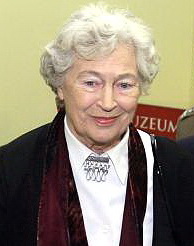Jadwiga Piłsudska: Difference between revisions
No edit summary |
|||
| Line 55: | Line 55: | ||
In 1944, she also married Lieutenant [[Andrzej Jaraczewski]], an officer in the [[Polish Navy]]. She has two children: a son, Krzysztof (in [[English language|English]], Christopher), and a daughter, Joanna. |
In 1944, she also married Lieutenant [[Andrzej Jaraczewski]], an officer in the [[Polish Navy]]. She has two children: a son, Krzysztof (in [[English language|English]], Christopher), and a daughter, Joanna. |
||
Due to the [[Communist]] takeover in [[Poland]], she remained in England after the War, as a political émigré. She |
Due to the [[Communist]] takeover in [[Poland]], she remained in England after the War, as a political émigré. She have never accepted British citizenship. She used [[Nansen passport]], ''valid for all countries in the world, except Poland''.<ref>A. Romanowski, ''Piękne wczoraj'', "Apokryf", No 13 (in "Tygodnik Powszechny, No 45/1998)</ref> |
||
In 1990, with the return to democracy, she returned to [[Poland]] and now lives in [[Warsaw]]. |
In 1990, with the return to democracy, she returned to [[Poland]] and now lives in [[Warsaw]]. |
||
Revision as of 07:28, 20 August 2010
Jadwiga Piłsudska | |
|---|---|
 | |
| Coat of arms | Piłsudski |
| Family | Piłsudski |
| Spouse | Andrzej Jaraczewski |
| Issue | Krzysztof Jaraczewski Joanna Jaraczewska |
| Father | Józef Piłsudski |
| Mother | Aleksandra Szczerbińska |
| Occupation | aviator architect |
Jadwiga Piłsudska-Jaraczewska (born February 20, 1920, in Warsaw, Poland) is a pilot, who served in the Air Transport Auxiliary during the Second World War. She is a daughter of Marshal and Naczelnik Józef Piłsudski.
Life

Jadwiga Piłsudska was born on February 20, 1920, in Warsaw, Poland, the younger daughter of Marshal Józef Piłsudski, Poland's Chief of State (1918–22) and dictator (1926-1935), by his second wife, Aleksandra.
In 1937 Jadwiga began flying gliders and obtained a pilot's licence. In 1939 she graduated from secondary school and decided to study aircraft engineering at the Warsaw Polytechnic.
In September 1939, Poland was invaded by the Nazis, initiating the Second World War, and her family realized that under the circumstance it would be prudent to leave the country immediately. Piłsudska fled with her mother and elder sister, Wanda, to Lithuania and eventually arrived in the United Kingdom. She resumed her studies, in 1940, matriculating at Cambridge University.
Later she acquired her aircraft pilot's license, and in July 1942, she joined the Air Transport Auxiliary. With the rank of Second Officer[1] (Flying Officer) she flew unarmed military aircraft in the dangerous skies of wartime Britain and was, with Anna Leska and the Lithuanian-Pole Barbara Wojtulanis, one of several Polish women who served as wartime ferry pilots in Britain.
In 1944, she took a leave of absence to continue her studies by enrolling in the Polish School of Architecture at Liverpool University. In 1946 she graduated with an engineering degree in architecture.
In 1944, she also married Lieutenant Andrzej Jaraczewski, an officer in the Polish Navy. She has two children: a son, Krzysztof (in English, Christopher), and a daughter, Joanna.
Due to the Communist takeover in Poland, she remained in England after the War, as a political émigré. She have never accepted British citizenship. She used Nansen passport, valid for all countries in the world, except Poland.[2]
In 1990, with the return to democracy, she returned to Poland and now lives in Warsaw.
Honors

She has been honored with a Bronze Cross of Merit with Swords and the Commander's Cross of the Polonia Restituta.
See also
References
- 1920 births
- Alumni of Newnham College, Cambridge
- People from Warsaw
- Female aviators
- Glider pilots
- Polish pilots
- Female military personnel
- Polish military personnel of World War II
- Polish World War II pilots
- Polish Air Force officers
- Air Transport Auxiliary pilots
- Polish architects
- Polish immigrants to the United Kingdom
- Recipients of the Order of Polonia Restituta
- Living people
- Polish female soldiers
